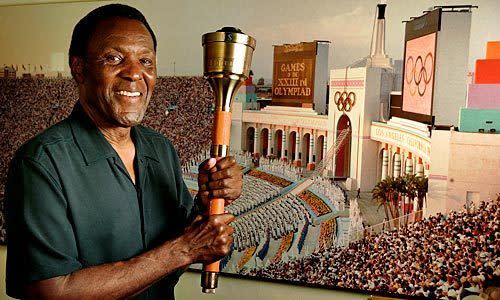UCLA community remembers Rafer Johnson, 'the greatest of all Bruins'
- Oops!Something went wrong.Please try again later.

Sixty years after he edged a UCLA training partner on weary legs in one of the most dramatic finishes in Olympic history, Rafer Johnson’s presence continued to blaze on campus like an inextinguishable flame.
He was a regular at track meets and basketball games and gymnastics meets even as his health declined, always graciously accepting requests to pose for photos with anyone who asked. He was also a confidant to longtime athletic director Dan Guerrero, serving as a special advisor who offered wisdom and guidance that no pricey consultant could match.
Johnson’s legacy as a decathlon champion and humanitarian, not to mention his trusted friendship, made it especially meaningful for Guerrero to be part of dedicating the Betsy and Rafer Johnson Track last year at UCLA’s Drake Stadium.
“It’s not a stretch for me to say that Rafer was the greatest of all Bruins,” Guerrero told The Times on Wednesday upon learning of Johnson’s death at his home in Sherman Oaks at age 86.
“When you think about it, apart from his athletic prowess, which placed him in history among the most heralded of all athletes, he passionately and selflessly and humbly dedicated his life to better people and our society whether it was through his work with Special Olympics, mentoring young students or his commitment to civil rights. He was a giant, there was no question about that, and while this description is probably thrown around rather capriciously, in this case it’s true.
“By losing Rafer, we’ve really lost a legend.”
He was a friendly legend. Art Spander, who covered Johnson's track exploits in the late 1950s as sports editor for the Daily Bruin before going on to become a longtime sports columnist in the Bay Area, recalled the nonchalance of his presence on campus.
“You know, it was a ‘Hi, Rafer’ type of thing and he went on his way and other students went on their way and he went to class,” Spander said. “I’d see him on campus and we’d talk and he was just a very unpretentious, good guy.”
Johnson captained UCLA’s freshman track and field team upon his arrival before winning a gold medal in the Pan American Games in the summer of 1955. The next year, he led UCLA to its first NCAA track and field championship.
He was elected student body president, displeasing detractors who sent him hate mail because he was Black. Johnson found refuge from the racial strife while playing basketball for two seasons under coach John Wooden, averaging 8.2 points per game as a starter during the 1958-59 season.
With the Dodgers having just arrived in Los Angeles and the Lakers still playing in Minneapolis, track was a huge draw in those days. Spander recalled large crowds jamming the Coliseum to watch meets involving Johnson and C.K. Yang, a fellow Bruin who became his training partner for the Olympics.

Johnson cemented himself as a worldwide sensation after holding off Yang in the final event of the two-day decathlon in the 1960 Rome Olympics. He finished only 1.2 seconds behind Yang in the 1,500-meter run, allowing the narrow points lead he had built entering the event to give him the gold medal.
“When Rafer got back [to Los Angeles], people were very happy,” Spander remembered. “It’s like, hey, we’ve got a world champion here.”
Johnson immediately retired from track but went on to help launch the California Special Olympics and was selected to light the Coliseum caldron before the 1984 Olympics. Avery Anderson, the UCLA director of track and field who had known Johnson for nearly three decades before his death, said Johnson had a naturally nurturing way with disabled children.
“I saw him as a loving father to his children and husband to his wife,” Anderson said, “but to the people he doesn’t know, especially with the Special Olympians, he never was any different. When you were dealing with Rafer, you were dealing with a gracious, caring, loving person and he was that way with everyone.”
Johnson remained a fixture at UCLA throughout the years, showing up at meets and offering encouragement that often left those on the receiving end wide-eyed.
“He’s the Michael Jordan of track, in my mind,” Anderson said, “and having his presence there as a Bruin, it’s always meant that and felt like that bigger-than-life figure and he’s our own as a Bruin.”
That presence continued to be felt after Johnson’s passing. UCLA basketball coach Mick Cronin appeared visibly upset when he opened his Zoom meeting with reporters Wednesday afternoon by offering a tribute to the legend whom he had hosted at his home during an event for former players.
“What a gracious man,” Cronin said. “Going back, and after meeting him, then reading about some of the things that went on in his life, I wish I had the character he had to deal with the things he dealt with with grace and dignity.”
This story originally appeared in Los Angeles Times.

